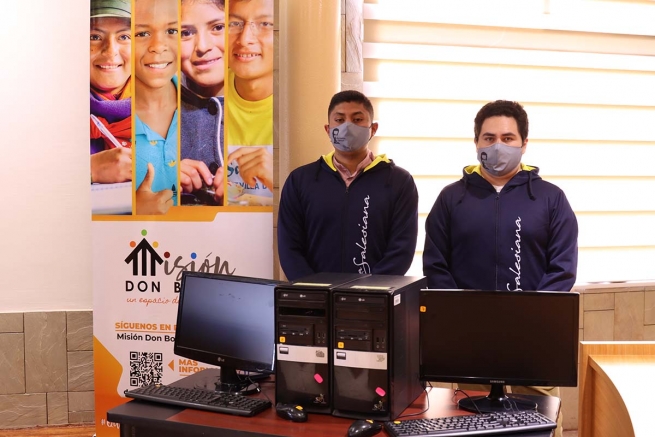ECUADOR: New Salesian initiative brings technology tools to children and older youth for remote learning access

(MissionNewswire) The Salesian Province of Ecuador, in collaboration with Don Bosco Mission and Salesian Polytechnic University, launched the campaign “Donate your computer” to provide technology tools to vulnerable populations in 12 cities across the country. This campaign is looking for a broad range of technology including tablets, laptops, PCs, keyboards, mice, screens, speakers and electrical cables.
According to UNICEF, only 37 percent of families in Ecuador have internet connection. In rural areas, only 16 percent of households have network connectivity. This means that these children cannot study at home, which has been critical since many areas are focused on remote learning during the coronavirus pandemic.
The initial goal of the campaign is to provide 500 technological tools so that children and older youth can attend virtual lessons, continue to digitally meet their classmates, do their homework and maintain hope for a better world through education.
Father Francisco Sánchez, Salesian provincial of Ecuador, said, “Today, we want to take a step forward and present this new campaign, a solidarity initiative under the slogan ‘No one excluded,’ to ensure that vulnerable children, adolescents and young people can study under the same conditions as those that have a connection.”
This initiative was launched by 30 students taking computer science courses at the Salesian Polytechnic University campus in Quito, who have repaired more than 100 electronic devices sent to the Salesian house in Esmeraldas since July. One of the students taking part in the initiative said, “Thank you for giving us the opportunity to demonstrate what it means to be good Christians and upright citizens.”
Salesian University offices on the campuses in Quito, Guayaquil and Cuenca are donation collection centers. An IT application was also developed that allows donors to know the status and destination of what they have donated, providing transparency. The evaluation and repair of the equipment are handled by students in the system’s engineering and computer science courses.
María Rosa Chasiluisa, who lives south of Quito and has six children, was one of the recipients of the donation. She said, “Thank you very much for giving this help to my children. I’m very happy because with this computer, they can make a career for themselves. I felt bad because my children, many times, were unable to connect to lessons or send their homework on time.”
Early in the pandemic, Salesian missionaries launched the “For daily bread” campaign, which is still underway and has provided more than 4,000 families a monthly card of $60 for the purchase of basic necessities.
Ecuador is one of the most inequitable societies in the world, according to UNICEF. The richest 20 percent of the population receives almost 50 percent of the national income, while the poorest 20 percent receives only 5 percent. According to the World Food Program, almost 26 percent of all children under age 5 have stunted growth, increasing to 31 percent in rural areas and 47 percent in indigenous communities.
Close to 20 percent of Ecuador’s population is people of indigenous heritage. For poor, rural and indigenous youth, education provides the best opportunity for finding employment, reducing inequities and breaking the cycle of poverty. Salesian missionaries have been providing education and other social programs for disadvantaged youth across Ecuador for more than 125 years.
###
Sources:
ANS Photo (usage permissions and guidelines must be requested from ANS)
ANS – Ecuador – “Donate your computer” – Salesians launch national campaign
Salesian Missions – Ecuador
Salesian Polytechnic University
Salesian Polytechnic University Facebook
UNICEF – Ecuador





